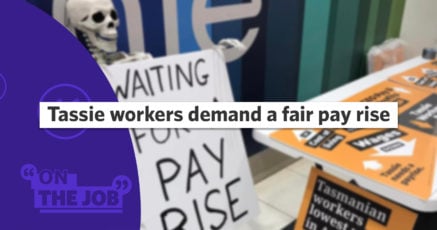Welcome to the great leap into the unknown.
As people across New South Wales get their week underway, there will no doubt be an enormous, instinctive sense of relief that the long lockdown they have endured is coming to an end.
It’s understandable. This period of forced confinement made necessary by the dangers of the COVID-19 pandemic has been punishing in so many ways, for so many people.
Families unable to see one another or juggling remote schooling and work. Businesses that have had to shut their doors. Workers who have lost jobs and are facing economic hardship. The list goes on.
Yet, there remains an anxiety too. No one can be sure what comes next as New South Wales opens up.
For the already battle-weary healthcare workers on the frontline of the pandemic response, opening up represent a plunge into uncertainty.
Already on the wafer-thin margins of capacity and resourcing, the possibility of another surge in cases is weighing heavily on those whose job it will be to deal with any spike in infections.
Annie Butler is the Federal Secretary of Australian Nursing and Midwifery Federation (ANMF). She told On the Job these are days of anxiety for her members.
“I think they’re pretty close to the edge – it’s really fair to say they’re at breaking point,” said Butler.
“In New South Wales, I understand that things are quieter at the moment but they’re very worried about what’s going to happen when people start to move around again, and whether they’ll be able to cope.”
“They’re very anxious. When we talk to our members you can hear it in their voice.”
Butler said that there is work being done to try and anticipate any sharp increase in hospital presentations, but any redirection of resources has consequences elsewhere within an already stressed health care system.
“We’re trying to get surge workforce. We’re using student nurses and students of other health professions as widely as we can so you can put high-skilled nurses where they are most needed and get students to assist in vaccination hubs as an example,” explained Butler.
“All that testing, tracing, screening, vaccination – it all takes nursing demand. When you keep pulling staff out of the acute sector, it has an impact.
“And that’s just dealing with COVID patients. We’re not even talking about the non-COVID demand. That’s just backing up and backing up. And we’re wondering how we’re going to cope with it all.”
The Federal Secretary of the ANMF is keeping a watch on the use of nursing resources as a consequence of the pandemic, concerned that new graduates and younger staff are being asked to do critical work without much experience.
“One of my concerns is that we are seeing new graduate nurses having a couple of days training and being put into ICU,” Butler told On the Job.
“We are seeing a diluting of the skills mix and the patient-carer ratio – which should be one-to-one with a ventilated patient.
“It’s infuriating to hear people say – oh well, we have the ICU capacity. Just because you can count beds and machines that have ventilators doesn’t mean you have the capacity to care for someone.
“So, they have had to shift and have one fully qualified ICU nurse with a couple of other registered nurses who might have done a bit of training – not that they’re not fully trained – but they just don’t have the level of expertise or experience.”
The long-term impact on nurses just entering the profession could be devastating according to Annie Butler.
“When new graduates are coming into this environment, if they think this is this picture of normal, are we at risk of not being able to keep them in the profession?
“Having to work under such stress is so challenging. And when our new graduates come in, they look to the older more experienced people around them to learn from, to be their mentors and guides and they’re watching them break.
“Some of our more experienced people are having to withdraw, saying things like ‘I can’t do this anymore.’”
As the COVID-19 pandemic response has been increasingly politicised and polarised, healthcare workers have also found themselves in the crossfire of the culture wars, targeted with abuse and intimidation just for doing their job, according to Butler.
“We’ve surveyed our members, and throughout the pandemic, they report being spat on, abused, and threatened by members of the public or patients, inside their workplace, and 16 per cent report that happening outside their workplace as well. How is that justified?” asked Butler.
“Because they’re a nurse, they’re going to be wherever they are needed, they’re going to provide care where it’s needed most, but they can’t do it alone.
“Some people need to take a moment and think about the courage, commitment, and the contribution people like our members and many others are making.”













SHARE:
Nurses face the unknown as New South Wales opens up